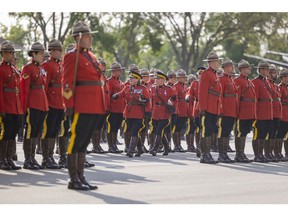As the RCMP readies for its 150th year, what better time to contemplate needed changes? What better place to implement changes than Regina?

Neither seems to balance off the reality of modern-day policing — either the practical problems associated with a tough and dangerous job or the reality that the RCMP and all police forces around the world struggle with issues emerging from minority communities or sometimes-deadly issues related to domestic violence.
There can be no doubt that the Nova Scotia inquiry is a long-overdue wakeup call for the RCMP. There’s even less doubt that the aforementioned issues of policing minority communities or violence in the home needed to be better addressed in police training years ago.
But there is also no doubt that Canada, perhaps more than ever before, needs well-trained police officers as part of a national police force — especially to serve in areas like Saskatchewan’s rural and northern communities, where the population is sparse and where officers daily face those struggles with increasingly fewer resources.
While Tell insists that it’s not the intent to have this new service replace the RCMP, Premier Scott Moe made the valid point that it’s getting hard enough to recruit police officers in this country as it is. Requiring what would amount to a university degree for RCMP officers will only worsen that situation.
The undesired, but inevitable outcome: Provinces will continue this march toward their own police training and even more problematic patchwork of local policing across the country similar to what we see in the United States.
It really doesn’t have to be this way. In fact, the solution might already be available in Regina, the longtime home of the RCMP. We just have to improve training in that home.
How about something more creative and thoughtful? How about expanding Regina training to something more than it’s been?
It begins with accepting what the RCMP hierarchy has not — that its 26-week training program needs to be overhauled.
This is not to say that RCMP training hasn’t evolved from its its initial mandate by Prime Minister John A. Macdonald as a paramilitary group to protect land acquisition.
Nor is training the same as it was for now-retired officers who went through the Regina academy when the focus for cadets was far more about discipline and fitness than community policing.
“It’s a living, breathing thing. Every single day, we make adjustments,” said Christine Hudy, director of training program support and evaluation, in an interview last year when she added that a “switch was flipped in the mid-1990s” when the emphasis moved to situational-based problem solving.
As opposed to separate training across the country as recommended, wouldn’t it be better to have RCMP cadets take sociology courses at the University of Regina, developed to be appropriate to policing needs? Wouldn’t that help the U of R? Wouldn’t it benefit police recruits across the country?
Isn’t there a natural synergy with Regina also the home of the First Nations University of Canada?
This goes well beyond notions of local tourism or employment. This makes more sense than a scattered training approach.
Enhanced RCMP training in Regina can work for everyone.
Mandryk is the political columnist for the Regina Leader-Post and the Saskatoon StarPhoenix.

Post a Comment